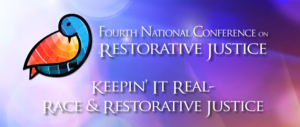 This Friday, June 21, at 9:15 am, IIRP assistant professor and director of continuing education Dr. John Bailie will present a breakout session titled, "Restorative Schools and Restorative Zones: A Whole-Community Approach to Limiting Youth Contact with Police and Justice Systems," at the Fourth National Conference on Restorative Justice in Toledo, Ohio. The theme for the conference is "Keepin' It Real – Race and Restorative Justice." John sent along the following to describe the scope of his talk, which is relevant to IIRP's work with diverse populations in urban areas:
This Friday, June 21, at 9:15 am, IIRP assistant professor and director of continuing education Dr. John Bailie will present a breakout session titled, "Restorative Schools and Restorative Zones: A Whole-Community Approach to Limiting Youth Contact with Police and Justice Systems," at the Fourth National Conference on Restorative Justice in Toledo, Ohio. The theme for the conference is "Keepin' It Real – Race and Restorative Justice." John sent along the following to describe the scope of his talk, which is relevant to IIRP's work with diverse populations in urban areas:
Restorative practices has the potential to offer an overarching framework, comprised of research-based interventions and interpersonal skills, which can transform how a complexly layered civil society develops social capital, builds community and responds to harm.
The rapidly expanding implementation of restorative practices in some of the world's most challenged schools has produced dramatic improvements in climate, reduced violence and limited the number of suspensions and expulsions.
However, beyond school walls, restorative practices also offers a wide range of formal and informal processes that can be applied at multiple levels of civil society by both professionals and community stakeholders. The IIRP has termed these areas “restorative zones.”
In a restorative zone, the interlocking government agencies that serve youth and families, such as police, probation and child services, as well as community stakeholders such as community groups, parents and faith leaders would all be trained in a similar range of restorative practices. The direct interpersonal nature of restorative practices tends to empower communities by giving them a meaningful opportunity to be heard and impact decisions that affect their lives.
Such projects are underway in the area of Bethlehem, Pennsylvania, USA, and in the planning stages in Philadelphia, Newark and Detroit. The restorative zone concept is rooted in the belief that restorative measures stand to benefit civil society most when they are employed, not only reactively after tragic or traumatic events, but also proactively in order to develop social capital, community and relationships that tend to prevent harm and violence from occurring in the first place.
Learn more about School-based restorative zones.
Keynote speakers at the conference include Dr. Angela Davis, Tim Wise, Dr. Julius Bailey, Dr. Theo Gavrielides, Sharletta Evans and Pete Lee.

